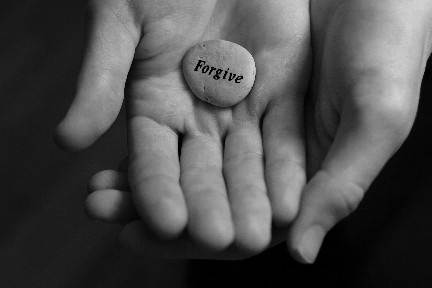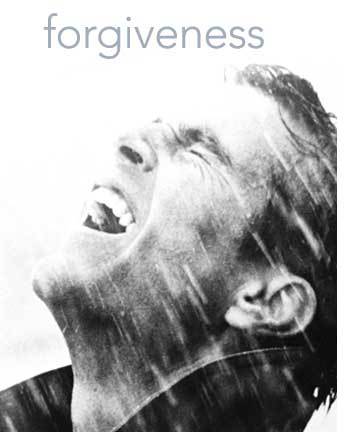
“One of the first things we learn is to say sorry and accept apologies”
Forgiveness makes
us happier – or does it? New thinking suggests it actually encourages bad
behaviour. So, should we challenge or chill, asks Leah Hardy
Mel, 32, is
planning her wedding, buying a house and has a demanding job as a solicitor.
Nevertheless, if her friends call, she’s there – even for the bridesmaidzilla
who’s already rejected three dresses. But while she faithfully traipses to
distant pubs to watch the footie (she reasons she might as well try to
like it, as her fiancé’s a die-hard fan), he ducks social events with her
friends, and is invariably late when it comes to ‘date night’. He blames his
‘stressful job’. She forgives him. Every time.
Sound familiar?
Most women would recognise the odd Mel moment, and class it as part and parcel
of keeping the peace. After all, we’re endlessly told forgiving others isn’t
just good manners, it’s good for our health and happiness, too. One of thee
first things we learn as toddlers is to say sorry, and accept apologies
graciously, and it’s a habit that’s reinforced through adult life. Women can be
particularly eager to channel frustrations through any means but and argument.
But now a new school of thought is suggesting all this equilibrium could be bad
for our health. Not only that but, it’s claimed, repeatedly forgiving people
encourages them to take advantage of us, opening the door for them to cause us
repeated pain, and – in the long run – damaging our self-esteem.

Dr Jeanne Safer, a
US psychologist and author of Forgiving & Not Forgiving, is an
advocate of this new thinking. ‘Some of the most admirable, sane and
emotionally healthy people I know don’t always forgive,’ she says. ‘There are
many circumstances in which [withholding forgiveness] is the proper and most
emotionally authentic course of action.’ Why? Because, as Mel admits, although
she jokes about her bridesmaid’s diva-like behavior, ‘Secretly I’m hurt she’s
knowingly adding to my stress when I was hoping for her support.’ Not being
honest about your feelings only undermines your relationships. In fact, Dr
Safer believes it’s ‘emotionally false – and ultimately damaging to yourself,’
to let bad behaviour go unchecked.
The results from a
recent study at the University of Tennessee add further weight to the
‘non-forgiveness’ case. Newlywed couples were asked what they did when their
partners nagged, criticised or shouted. If they chose to forgive rather than
challenge the behaviour by arguing back or giving them the cold shoulder, it
was up to six times more likely to happen again the next day. Lead researcher
James McNulty explains: ‘It may be that by having bad behaviour challenged,
partners realise their negative actions have negative implications for the –
like anger or loneliness – so they’re less likely to repeat it.’ Christine
Northam, a counsellor for the charity Relate, agree. ‘If your’re upset by your
partner’s behaviour but constantly fail to challenge it, it can start to erode
your self-confidence because you’re essentially saying you don’t deserve
better,’ she says.
So how do you not
forgive someone without ending up bitter and twisted? Most people see not
forgiving as negative, but Dr Safer believes it can be positive and healthy.
One suggestion is to keep the conversation thoughtful and specific. For
example, explaining to your bridesmaid that her fussiness is creating problems
relieves you of your frustrations and gives her a chance to make it right –
maybe she never realised her behaviour had such an impact on you.
Before we let rip
at every wrong doing we encounter, Christine suggests we check ourselves, too.
‘We often judge people against out own standards, and expect them to behave as
we do, then blow up when they don’t. remember, people aren’t necessarily doing
things deliberately to hurt you – they just do them differently – or they might
just be having a bad day.’ Is it really worth having it out with the Topshop
queue jumper for the sake of two minutes if you’ll spend your afternoon stewing
over her passive-aggressive death stare?
Marina
Cantacuzino, founder of theforgivenessproject.com, agrees there are times when
the benefits off forgiving outweigh the reasons for letting rip. ‘When you’re
hurt, it’s hard to think of anything else, so, in a way, you’re controlled by
it. Forgiveness can be a kind of victory over events.’ On Marina’s website, a
father writes about forgiving his son’s killer, and consequently being able to
reclaim his own life. This might be too much for many of us, but we probable
all have a friend who’s allowed the bitterness of a failed relationship to
prevent her from moving on and finding happiness.
The problem is, we
often see forgiveness as a weakness (think tabloid headlines about
‘downtrodden’ celebs taking their ‘bad boys’ back) and ‘not forgiving’ as mean,
angry or vengeful. In reality, it’s not that simple, and rather than a sign of
weakness, forgiveness can be and empowering choice. The key, say experts, it to
shift our perception. As marina says, ‘Forgiveness doesn’t mean excusing what
happened. You can speak up for yourself without being aggressive, meaning you
don’t hold onto the resentment that can build.’

What’s more, in
the right circumstances, forgiveness has psychological benefits, says Miriam
Akhtar, psychologist and author of Positive Psychology for Overcoming
Depression. ‘Studies show forgiving reduces anger, hostility, depression,
and anxiety,’ she says. Another study, published in the Journal of
Behavioral Medicine, associated forgiveness with lower blood
pressure and
stress relief, and the University of Tennessee and University of
Wisconsin researchers found forgiveness was associated with fewer
chronic conditions and
physical symptoms from illness.
‘Forgiveness isn’t
about being a doormat to someone’s abusive behavior,’ insists Miriam. ‘By
shifting your perception, you can feel proud of your choice to forgive because
it frees you – not because it excuses the other person.’ In a relationship,
‘Forgiveness is important,’ agrees Chiristine, ‘but there are some things that
should be an unforgiveable deal-breakers, such as violence or cruelty. Putting
up with that doesn’t make you a happier, better person, but having good
boundaries can.’